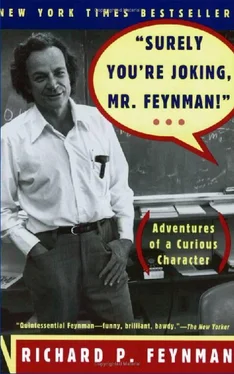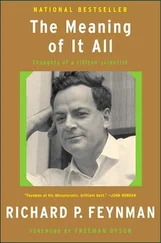One time, a few years after I had won the Nobel Prize, some kids from the Irvine students’ physics club came around and wanted me to talk. I said, “I’d love to do it. What I want to do is talk just to the physics club. But—I don’t want to be immodest—I’ve learned from experience that there’ll be trouble.”
I told them how I used to go over to a local high school every year to talk to the physics club about relativity, or whatever they asked about. Then, after I got the Prize, I went over there again, as usual, with no preparation, and they stuck me in front of an assembly of three hundred kids. It was a mess!
I got that shock about three or four times, being an idiot and not catching on right away. When I was invited to Berkeley to give a talk on something in physics, I prepared something rather technical, expecting to give it to the usual physics department group. But when I got there, this tremendous lecture hall is full of people! And I know there’s not that many people in Berkeley who know the level at which I prepared my talk. My problem is, I like to please the people who come to hear me, and I can’t do it if everybody and his brother wants to hear: I don’t know my audience then.
After the students understood that I can’t just easily go over somewhere and give a talk to the physics club, I said, “Let’s cook up a dull-sounding title and a dull-sounding professor’s name, and then only the kids who are really interested in physics will bother to come, and those are the ones we want, OK? You don’t have to sell anything.”
A few posters appeared on the Irvine campus: Professor Henry Warren from the University of Washington is going to talk about the structure of the proton on May 17th at 3:00 in Room D102.
Then I came and said, “Professor Warren had some personal difficulties and was unable to come and speak to you today, so he telephoned me and asked me if I would talk to you about the subject, since I’ve been doing some work in the field. So here I am.” It worked great.
But then, somehow or other, the faculty adviser of the club found out about the trick, and he got very angry at them. He said, “You know, if it were known that Professor Feynman was coming down here, a lot of people would like to have listened to him.”
The students explained, “That’s just it! ” But the adviser was mad that he hadn’t been allowed in on the joke.
Hearing that the students were in real trouble, I decided to write a letter to the adviser and explained that it was all my fault, that I wouldn’t have given the talk unless this arrangement had been made; that I had told the students not to tell anyone; I’m very sorry; please excuse me, blah, blah, blah …” That’s the kind of stuff I have to go through on account of that damn prize!
Just last year I was invited by the students at the University of Alaska in Fairbanks to talk, and had a wonderful time, except for the interviews on local television. I don’t need interviews; there’s no point to it. I came to talk to the physics students, and that’s it. If everybody in town wants to know that, let the school newspaper tell them. It’s on account of the Nobel Prize that I’ve got to have an interview—I’m a big shot, right?
A friend of mine who’s a rich man—he invented some kind of simple digital switch—tells me about these people who contribute money to make prizes or give lectures: “You always look at them carefully to find out what crookery they’re trying to absolve their conscience of.”
My friend Matt Sands was once going to write a book to be called Alfred Nobel’s Other Mistake.
For many years I would look, when the time was coming around to give out the Prize, at who might get it. But after a while I wasn’t even aware of when it was the right “season.” I therefore had no idea why someone would be calling me at 3:30 or 4:00 in the morning.
“Professor Feynman?”
“Hey! Why are you bothering me at this time in the morning?”
“I thought you’d like to know that you’ve won the Nobel Prize.”
“Yeah, but I’m sleeping! It would have been better if you had called me in the morning.”—and I hung up.
My wife said, “Who was that?”
“They told me I won the Nobel Prize.”
“Oh, Richard, who was it?” I often kid around and she is so smart that she never gets fooled, but this time I caught her.
The phone rings again: “Professor Feynman, have you heard …”
(In a disappointed voice) “Yeah.”
Then I began to think, “How can I turn this all off? I don’t want any of this!” So the first thing was to take the telephone off the hook, because calls were coming one right after the other. I tried to go back to sleep, but found it was impossible.
I went down to the study to think: What am I going to do? Maybe I won’t accept the Prize. What would happen then? Maybe that’s impossible.
I put the receiver back on the hook and the phone rang right away. It was a guy from Time magazine. I said to him, “Listen, I’ve got a problem, so I want this off the record. I don’t know how to get out of this thing. Is there some way not to accept the Prize?”
He said, “I’m afraid, sir, that there isn’t any way you can do it without making more of a fuss than if you leave it alone.” It was obvious. We had quite a conversation, about fifteen or twenty minutes, and the Time guy never published anything about it.
I said thank you very much to the Time guy and hung up. The phone rang immediately: it was the newspaper.
“Yes, you can come up to the house. Yes, it’s all right. Yes, Yes, Yes …”
One of the phone calls was a guy from the Swedish consulate. He was going to have a reception in Los Angeles.
I figured that since I decided to accept the Prize, I’ve got to go through with all this stuff.
The consul said, “Make a list of the people you would like to invite, and we’ll make a list of the people we are inviting. Then I’ll come to your office and we’ll compare the lists to see if there are any duplicates, and we’ll make up the invitations …”
So I made up my list. It had about eight people—my neighbor from across the street, my artist friend Zorthian, and so on.
The consul came over to my office with his list: the Governor of the State of California, the This, the That; Getty, the oilman; some actress—it had three hundred people! And, needless to say, there was no duplication whatsoever!
Then I began to get a little bit nervous. The idea of meeting all these dignitaries frightened me.
The consul saw I was worried. “Oh, don’t worry,” he said. “Most of them don’t come.”
Well, I had never arranged a party that I invited people to, and knew to expect them not to come! I don’t have to kowtow to anybody and give them the delight of being honored with this invitation that they can refuse; it’s stupid!
By the time I got home I was really upset with the whole thing. I called the consul back and said, “I’ve thought it over, and I realize that I just can’t go through with the reception.”
He was delighted. He said, “You’re perfectly right.” I think he was in the same position—having to set up a party for this jerk was just a pain in the ass, It turned out, in the end, everybody was happy. Nobody wanted to come, including the guest of honor! The host was much better off, too!
I had a certain psychological difficulty all the way through this period. You see, I had been brought up by my father against royalty and pomp (he was in the uniforms business, so he knew the difference between a man with a uniform on, and with the uniform off—it’s the same man). I had actually learned to ridicule this stuff all my life, and it was so strong and deeply cut into me that I couldn’t go up to a king without some strain. It was childish, I know, but I was brought up that way, so it was a problem.
Читать дальше












